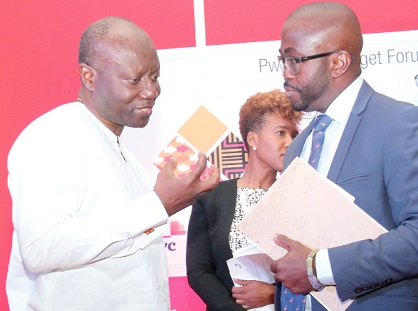
Govt releases GH¢2 billion to pay contractors
The government is to release about GH¢2 billion between this year and early 2019 to settle outstanding arrears owed contractors, mostly in the road sector, the Minister of Finance, Mr Ken Ofori-Atta, has said.
Giving details about the payment soon after a 2019 post-budget session under the auspices of PricewaterhouseCoopers (PwC), an international accounting and auditing firm, the Minister of Finance explained: “The decision to release the funds follows a comprehensive audit undertaken by the Auditor-General after we suspected some anomalies in some of the bills submitted to the government for payment.”
Concerns
Earlier at the session, the President of the Ghana Association of Bankers (GAB), Mr Alhassan Andani, had raised concerns about the impact of the amount owed contractors on the operations of banks in the country and urged the government to take steps to settle those arrears to bring some relief to the banks caught up in that web.
In his response, Mr Ofori-Atta said what was presently outstanding was in the region of about GH¢3.4 billion but gave an assurance of the government’s commitment to release the funds to pay the contractors.
Effect on economy
The release of the funds will help stimulate the economy, particularly with just about nine weeks to the Yuletide.
It will also help bring down the non-performing loans (NPLs) on the books of commercial banks, which currently hover around GH¢8.74 billion.
The intention of the government to settle contractors’ arrears comes on the back of the commitment made by the government to make infrastructure development a key component in its expenditure agenda for next year.
In 2017, the government raised red flags over some claims being made by contractors for works executed for the state, describing them as suspicious and for which reason it was forced to subject the entire claims to an audit.
In the end, about GH¢5.6 billion was frozen in a move that allowed the government to use the Auditor-General to conduct a comprehensive audit of the claims made to ensure that what was paid out was a true reflection of what was actually owed.
It is, however, not clear how much was detected to be fraudulent claims, but the Minister of Finance said he was optimistic that the payment would help relieve not only the contractors involved but the banking sector in general, suppliers of the contractors and other businesses.
Caution to govt after IMF exit
At the post-budget session, speakers, including Mr Andani and the Executive Director of CDD Ghana, Professor H. Kwasi Prempeh, called on the government to strictly adhere to the projected expenditure as earmarked in the budget to avoid overruns.
According to them, with the general election in sight, the temptation to spend more would be high, noting that should the government attempt any such move, it would completely derail the gains it had made in the last 22 months.
“We have been hearing a lot of the excitement to exit the International Monetary Fund (IMF) programme and it sounds as if we want to go back to the old days of over-spending,” Mr Andani said.
According to him, there was the need for caution because “investors listen to the IMF, and so if we do something wrong with our expenditure and do not ensure consolidation, it will affect the confidence level in our economy and we will suffer”.
The government has earmarked to spend some GH¢73 billion and raise GH¢58.9 billion this year, creating a deficit of 4.2 per cent of Gross Domestic Product (GDP).
Prof. Prempeh, on the other hand, said the gains made in the period under review were positive but urged the government to be extremely cautious to keep expenditure within limits.
He said the discipline that the IMF programme would leave behind must be followed to ensure sustainability.
In his response to the fears and concerns raised, Mr Ofori-Atta said: “We are not going to overspend just because we are no longer on the IMF programme.”
He said per the tradition of the party since the days of Busia, it had not overrun its budget, adding that “we will not do that to keep that tradition going”.
Macroeconomic stability
The Senior Country Partner of PwC, Mr Vish Ashiagbor, who moderated the session, commended the government for maintaining, in the 2019 budget, the general thrust of the 2018 budget, which was hinged on ensuring macroeconomic stability.
He said the government’s focus on macroeconomic stability would repose confidence in the business community and propel growth in the economy through job creation.
He, however, urged it to adopt electronic payment systems such as mobile money in tax collection to expand the tax net to capture the informal sector.